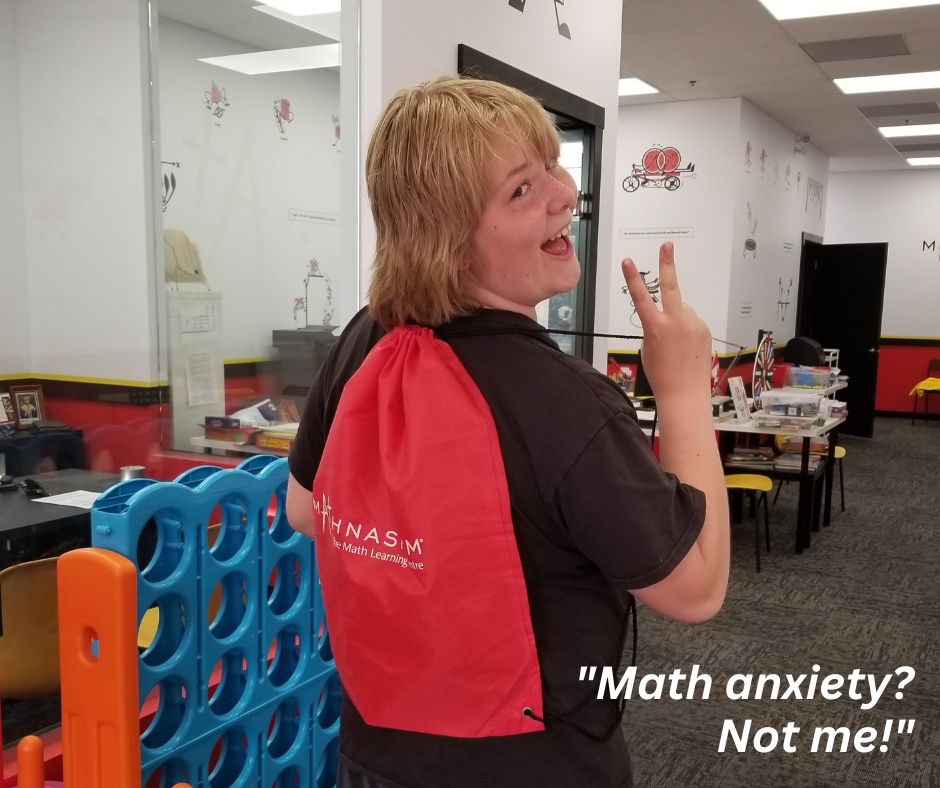DISCOVER WHAT SETS OUR STAR STUDENT APART!
Meet our February 2024 Student of the Month, a beacon of dedication and achievement! This exceptional student, receiving the award for the second time, exemplifies perseverance and passion for learning.

Lifelong impact of math anxiety
It was at a festival not so long ago. A child was looking at our math question spinning wheel in the distance, wondering what that is. “Hey, wanna try a math question?” I asked him, thinking that he was interested to try. Suddenly his expression changed, terror in his eyes (okay, okay .. I’m exaggerating .. lol), he shook his head profusely, and walked away.
As a parent, you might believe that your six-year-old child's signs of math anxiety are nothing to worry about. "They're still so young," you reassure yourself, thinking it will naturally improve over time. However, studies reveal a troubling truth: math anxiety at a young age accumulates knowledge gaps throughout school, resulting in lower math grades and limited career choices.
Math anxiety also significantly impacts life success and satisfaction. The implications of math anxiety go far beyond school because math learning also cultivates critical thinking, resilience, and self-discipline. And therefore, down the road math anxiety can lead to poor financial and health decisions, avoidance of challenges, and low self-confidence.
Addressing this issue head-on will secure their math confidence and unlock a world of future opportunities for them.

How to overcome math anxiety?
Number one is to change our own mindset. Curiously, in Western culture, it has become socially acceptable for individuals to proclaim they hate math and even take pride in it. Whenever I met people – from a shuttle driver (who said “it is impossible to make math fun”), other attendees in a business event, or parents who come to our centre – it’s more often than not, I hear them say “I’m bad at math”. Without realizing it, this mindset could transmit negative attitudes and anxiety towards math to their child. This attitude is so common that according to the PM of England it has become an economic issue and prompted him to make math education mandatory until the age of 18.
Number two is providing support and resources necessary to alleviate your child’s math anxiety. One of them is to send them to a tutor that fit your child’s needs. According to a study from the Stanford University School of Medicine, cognitive tutoring is not only improves math performance but it is also anxiety-reducing.
Tutoring relieves math anxiety
The main reason why great tutoring relieves math anxiety is because it is using a personalized approach.
Comprehensive assessment. A great tutoring program can identify your child’s specific math gaps. Instead of saying “your child’s math skills are at grade 2,” and then your child must mindlessly repeat all skills from that level, whether they’re already good at it or not. A good tutor will go deeper than that. Through comprehensive assessment, they can highlight the student’s detailed strengths. For instance, “your child is already good at multi-digit addition and subtraction, but still needs to work on halving odd numbers, money equivalence and word problems”.
Customized instruction. They can adapt their teaching methods to align with your child’s unique learning style and pace of learning during sessions. Unlike a school setting where teachers must move forward according to the curriculum requirement, a tutor can provide additional support until your child comprehends and masters a concept fully.

What are the other reasons why a great tutor can relieve math fear?

In essence, math anxiety can prevent individuals from reaching their full potential – don’t let this happen to your child. One of our students, a grade 6 girl, was excited at the end of a session, “Oh, long division is not as scary as I thought!” and it was totally her turnaround perception on long division just a month earlier. Mathnasium motto “Changing lives through math” rings so true, because we have witnessed math struggles turned into victory dances! 😊
